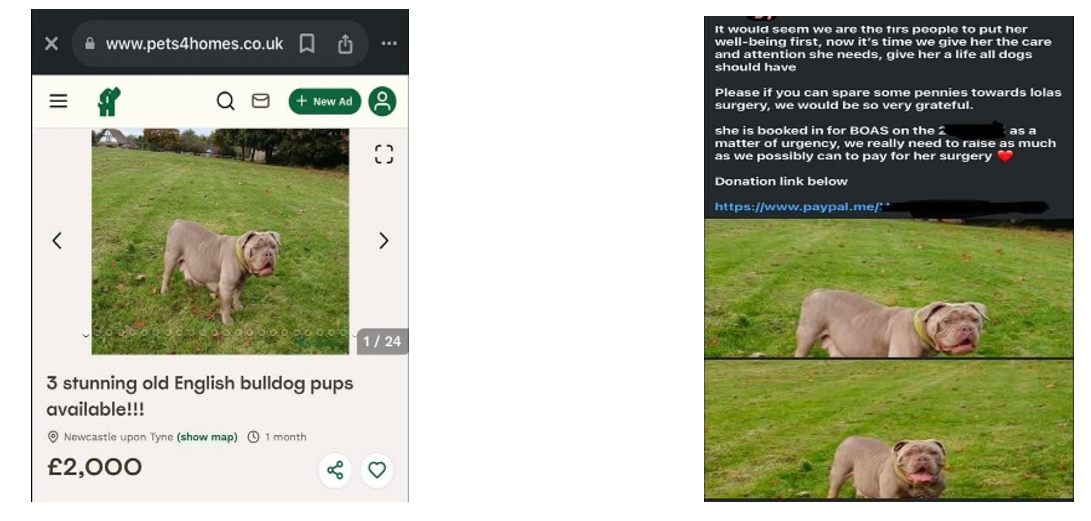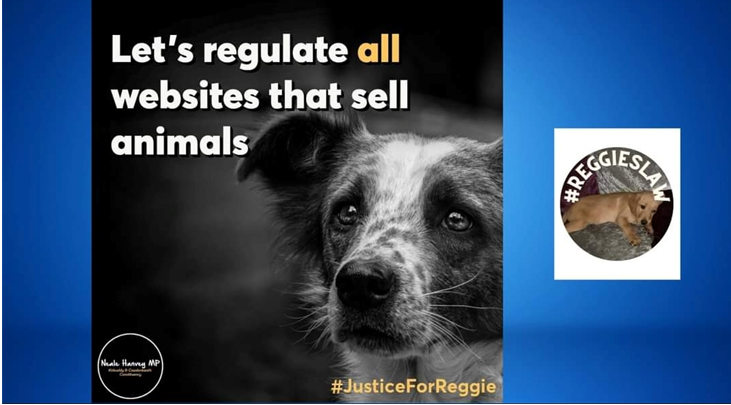January 2025
The Need to Regulate Online Selling Platforms
Apologies for the delay and thank you all for your patience. As promised, please find the feedback from the meeting with Pets4Homes.
As we are all aware, not all online selling platforms advertising animals are regulated. Justice for Reggie (JFR) have regular meetings with some of the top animal selling platforms in the UK and many MP’s to demand regulation of online selling platforms. All too often, we see the lack of animal welfare on the selling sites due to illegal breeding. Pet buyers are then left with the emotional turmoil of racking up huge vet bills, or worse when their puppy dies.
For those of you who have been eagerly waiting to hear the outcome of the meeting we had with Pets4Homes (P4H), we are a little disappointed that it wasn’t the outcome we expected. However, we want to congratulate P4H for taking some steps to protect animal welfare and making their site safer with their verification checks.
P4H was founded in 2005 and is the UK’s largest online pet marketplace, relied upon by up to 7 million people each month, helping to rehome around 2,500 pets each day.
P4H do state they are not an enforcement agency, nor do they visit the advertiser’s homes. Therefore, it is solely the responsibility of the buyer to do their research when buying a pet. Although JFR would like to point out that, they do actively encourage the buyer to report any suspicious adverts to them.
Prior to our planned meeting, we sent our agenda over to our contact at P4H that covered six areas:
Watermarks on Photos
JFR have concerns relating to the position of the watermarks on the photos in the adverts. So can watermarks on the photos protect from theft? Yes, they can to a point, although if the watermark is placed on the animal’s photo it is more difficult to crop, steal and use illegally.
P4H use watermarks on all of the sellers’ photos on the advert. However, in this case in the photo below, the watermark is at the bottom making it easy to steal and use in other adverts.
A pop-up rescue with the same name as a reputable rescue had taken this photo from an advert and cropped off the watermark at the bottom. They then used it to ask for donations on their website. We asked P4H if they intend to move their watermark to deter theft but unfortunately, they do not have any plans to change the position, as buyers need to see the animals’ face. We did challenge this with P4H and they agreed to look into it.
Due to the cropping of photos and the amount of sellers claiming they are rescues, we raised a concern relating to the identification required to verify they are a rescue. P4H say they check on the Charities Commission, and if any are not registered on there, they look on social media to see how many followers they have. If they are confident, they accept them as a rescue and the adverts go live. P4H ask all buyers to complete the same checks.
Licensing Breaches
JFR applaud the many licensed breeders out there by doing everything by the book. However, over the last two years we have investigated a few adverts from a licensed breeder who has added multiple litters to pre-order on the same advert, making thousands of pounds and in breach of their licensing and HMRC rules. P4H informed JRF that the sellers could change the description and photos within the advert, although they cannot change the number of pets. They are fully aware that this happens but there are no plans to change anything.
Unlicensed Breeders
JFR asked about the unlicensed breeder offering nine separate litters of pups in one advert who was found to have a turnover of a minimum of a £38,000. P4H pointed out that they are not the council and therefore not responsible for the decision whether a seller needs a license or not. Although P4H do report sellers to the local authority particularly when there are welfare issues. Some they tell us are fantastic at responding but many do not reply. We have experienced first-hand that some councils go beyond their duties but many do not carry out any investigations. Some local authorities have said that they have given breeding licenses to people just so that they can monitor their activities. So who is holding these councils accountable? Is it DEFRA?
Required Identification (ID)
Currently a minimum of an email address and phone number is required for any breeder or seller to advertise on most of the selling platforms. Many unscrupulous breeders then fall under our radar using different locations such as shopping centres, industrial sites, colleges and random postcodes – because they can. This helps them to operate anywhere and use any address to sell the puppies then move on to sell more. With ID verification (what JFR continually request), a valid passport or driving license at the very least is so simple and cost effective and will certainly weed out the puppy farmers.
P4H have set up their own ID verification, which we hope will go a long way to weed out the illegal breeders, sellers and puppy farmers.
They state all new users who register have a Know Your Customer (KYC) payment scheme. This means they hold a passport or driving license and photo ID. They then have a blue tick on their profile. The buyers’ money and the health of the pup is also protected for 6 months. This helps to build up trust for the buyers.
Pets4homes informed JFR that if a buyer has purchased a sick pup or a puppy dies who was purchased through their platform, they should make contact with P4H and request a full copy of the published advertisement. They should also contact their local authority to report the seller. P4H disclose any information on the seller to the local authority if they ask. As we have said before, some local authorities are very proactive with their requests although some are sadly not.
Reviews
It is interesting that since P4H have asked new users for ID verification, there have been some complaints on Trustpilot. Many sellers do not want to give their personal details, however the buyers need to understand that sellers need to be open and transparent and would be more than happy to disclose these if they have nothing to hide. Well done P4H!
Kennel Club (KC) Registered Advertised
We have found false advertising stating pups are Kennel Club Registered (KC) when they cannot be because of the breed.
Pets Advertised for Free
Sadly, JFR see many dogs advertised free and are probably on their third or fourth home. We can only imagine the fate for these poor dogs. We asked P4H about the requirement to advertise a pet for free. Pets4Homes state the seller needs to add a minimum of £75 before the advert can go live. JFR challenged this.
Microchips
JFR raised the question relating to microchips as we do so in every meeting. P4H have no plans to include the 15-digit microchip numbers as they state any 15-digit number could be used. In the UK it isn’t compulsory to include the microchip details. However, they admit that according to other Databases in the Netherlands, microchip details are accessible to the public including date of birth, place they were born and selling history etc.
PAAG
The Pet Advertising Advisory Group (PAAG) have been operating as an advisory body to the platforms since 2001. They say they have witnessed a massive increase in the number of animals of advertised online and they aim to raise awareness on the need to be responsible when looking to buy a pet. PAAG are an advisory body only so selling platforms can choose whether to engage with them or not – this is why regulation is needed!
Can and Should the Government do More?
The answer is yes. Far too many government bodies and organisations are ignoring animal welfare. Pet shops no longer sell animals as we move into the digital age and buying an animal online is now the norm. Where is the regulation to protect these animals and the buyers?
The Government are taking money from hardworking people and pensioners while these illegal sellers continue to make huge profits from the online puppy trade, often without a thought for animal welfare. What are the local authorities doing and do they have adequate resources and staff? They should have enough staff to meet the welfare needs of animals and have the necessary qualifications and experience. Are they always proactive in their investigations? We do wonder.
To Conclude
We have had many meetings with P4H over the last 4 years and thought we were making some headway into tackling illegal breeding and animal welfare concerns. However, in response to the above questions we raised, all responsibility falls on the buyers and local authorities to do their reporting and investigating. P4H state they cannot monitor all the sellers across their site and rely on the public to carry out their research. Nevertheless, we will remain positive and welcome future meetings to maintain good relationships with the selling platforms to address fraudulent activity.


